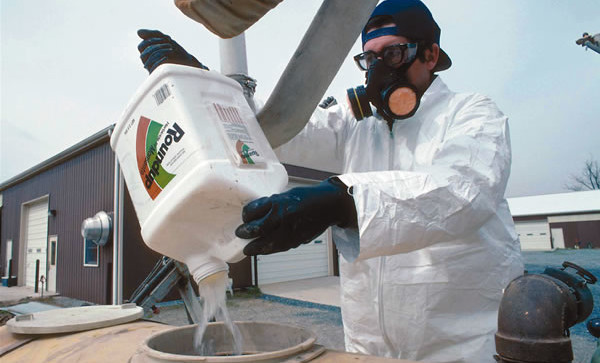A new peer-reviewed analysis shows that EFSA and ECHA twice watered down the statistical strength of evidence linking glyphosate with tumour increases.

Source: GM Watch
The European Food Safety Authority (EFSA) and the European Chemicals Agency (ECHA) were only able to conclude that the pesticide active ingredient glyphosate is not a carcinogen by inconsistently applying and even directly violating the applicable regulations and guidelines. This is the outcome of a new peer-reviewed analysis published in the Journal of Epidemiology and Community Health.[1]
The new analysis shows that if the European authorities had properly applied their own benchmarks and “weight of evidence” approach, they would have inevitably concluded that glyphosate is carcinogenic. The analysis includes a science-based rebuttal of ECHA’s claim that it adequately addressed concerns about how it applied statistical analyses and the weight of evidence approach.[2]
THE GLYPHOSATE BOX
New: Hair Testing – Find Out Your Long-Term Exposure to Pesticides
Test Yourself for Glyphosate and Join New Glyphosate Biobank
It has been known since 2015 that EFSA dismissed 11 statistically significant increases in tumour incidences associated with glyphosate in seven different animal studies performed by industry to support regulatory authorization of the pesticide.[3]
But the new analysis demonstrates for the first time that the European authorities chose to arbitrarily weaken the strength of statistical evidence twice over, even before they considered the biological relevance of the tumour findings.
The authorities are bound by law to follow Regulation (EC) 1272/2008, the so-called CLP (Classification, Labelling and Packaging) Regulation. They also have to respect guidance documents published by ECHA and OECD.
However, the authorities did not follow these rules when reaching their conclusions, the new analysis shows. Lead author Dr Peter Clausing, a toxicologist who works with Pesticide Action Network Germany, said, “We demonstrate that EFSA’s and ECHA’s judgement that glyphosate is non-carcinogenic was based on multiple deviations from the proper use of weight of evidence principles.
“For instance, both authorities ignored the fact that some of the tumour findings were reproduced in the majority of studies and that the increases in kidney cancers and malignant lymphomas were dose-dependent. Such reproducibility and dose-dependence are strong confirmations that the cancer increases did not happen by chance and that glyphosate was responsible.”
Dr Clausing explained, “According to current legislation, two animal experiments with significant cancer findings are sufficient to classify a pesticide as a presumed human carcinogen. EFSA had eleven. In order to claim that there is no evidence of carcinogenic effects, the authorities had to downplay these findings with multiple violations of applicable guidelines and guidelines. Otherwise, a ban on glyphosate would have been unavoidable. We scientifically analyzed this downplaying.”
In their analysis, the study authors identify as the most relevant irregularities of the EU authorities:
* Multiple violations of the relevant OECD and ECHA recommendations on the use of historical controls
* False claim of a (fictional) “limit dose” for cancer studies of 1,000 milligrams per kilogram of feed, implying that a dose above this would compromise the reliability of the results
* False claim of a lack of reproducibility
* Failure to acknowledge dose-related effects of certain cancer effects.
Dr Clausing added, “When the relevant rules and guidance and a transparent weight of evidence approach are correctly applied, they support the finding of statistically significant tumour increases. The inevitable conclusion is that glyphosate is a carcinogen and should be banned.”
Dr Clausing’s co-authors on the new publication are Claire Robinson of GMWatch and Dr Helmut Burtscher-Schaden of GLOBAL2000 (Friends of the Earth Austria).
Dr Burtscher-Schaden, a biochemist, said, “The deviation from applicable guidelines for the evaluation of cancer studies by the European authorities appears to be systematic. The motives behind this failure or misconduct must be investigated. Also we must ask if comparable misconduct has occurred in the assessment of other pesticide active substances.”
Dr Burtscher-Schaden continued, “I hope these important questions will be addressed and answered by the Special Committee[4] that will be set up by the European Parliament to assess potential failures and conflicts of interest in the approval procedure for pesticides.”
Claire Robinson said, “This publication exposes the falsity of claims by Bernhard Url,[5] the director of EFSA, that critics of EFSA’s assessment are ignoring strong evidence that glyphosate is safe and are choosing instead to ‘tout weak scientific studies showing the opposite’. Dr Url also claimed that critics are wrongly ‘picking on regulatory science’ when ‘they are really railing against bigger issues: the role of modern agricultural practices and multinational biotech firms in our food supply’.”
Claire Robinson continued, “Regarding Dr Url’s first accusation, as our analysis shows, the evidence from industry’s own studies on animals – the very same evidence that EFSA claims to follow – shows unequivocally that glyphosate is carcinogenic. Regarding his second accusation, we are simply asking EFSA and ECHA to be true to the scientific evidence and act in accordance with the rules. According to the hazard-based cut-off criteria laid down in the EU’s pesticide regulation 1107/2009, this would inevitably have resulted in a ban on glyphosate.”
Notes
1. Clausing, P., Robinson, C., and Burtscher-Schaden, H. Pesticides and public health: An analysis of the regulatory approach to assessing the carcinogenicity of glyphosate in the European Union. Journal of Epidemiology and Community Health, 2018. jech.bmj.com/cgi/content/full/jech-2017-209776 (open access)
2. ECHA (2017). Subject: ECHA’s response to Global 2000’s response to ECHA of 21 August on glyphosate. echa.europa.eu/documents/10162/22931011/echa_global_2000_2.pdf/9619650d-519f-0b4d-333c-9a9b721e5312
3. The 11 significant increases were described in BfR’s (German Federal Institute for Risk Assessment) Addendum dated August 2015 (available at gmwatch.org/files/Renewal_Assessment_Report_Glyphosate_Addendum1_RAR.pdf), while only one was mentioned in the EFSA Conclusion approved on 30 October 2015 (EFSA. Conclusion on the peer review of the pesticide risk assessment of the active substance glyphosate, EFSA Journal 2015;13(11):4302. doi.wiley.com/10.2903/j.efsa.2015.4302).
4. www.greens-efa.eu/en/article/press/european-parliament-group-presidents-endorse-special-committee/
5. www.nature.com/magazine-assets/d41586-018-01071-9/d41586-018-01071-9.pdf


















